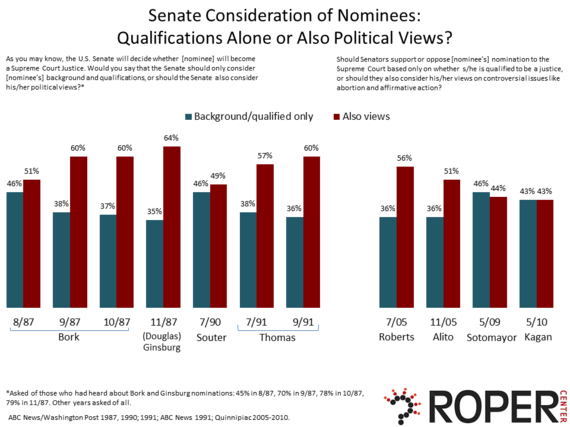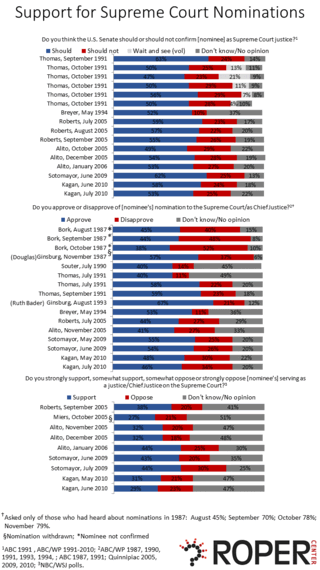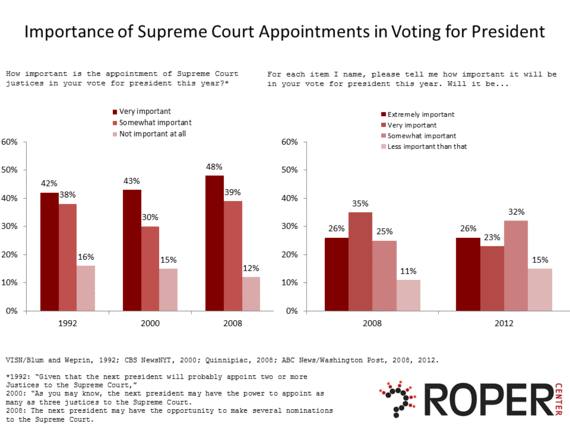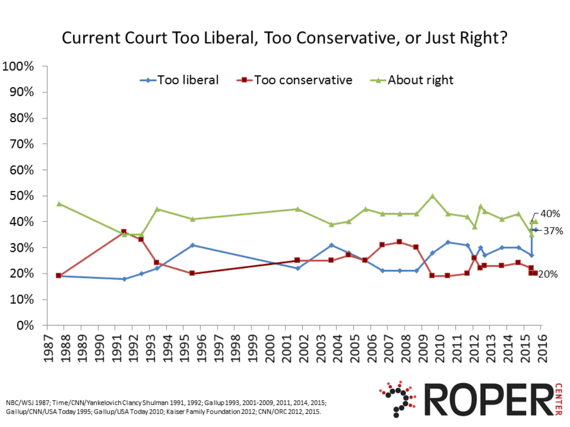
The death of Supreme Court Justice Antonin Scalia has ignited a political firestorm, with Senate Republicans declaring their refusal to vote on any nominee the president might send for confirmation. A review of historical polling on Supreme Court nominations indicates that Republicans may face a backlash in public opinion if they follow Majority Leader Mitch McConnell's vow to keep Scalia's seat empty until 2017. From the Roper Center for Public Opinion Research archives:
Ideology and confirmation
The notion that a Supreme Court nominee should be confirmed solely on their qualifications has not been long supported in public opinion polls. In fact, the public has often preferred that the Senate consider both a nominee's qualifications and political views. In a 2009 CBS News/NYT poll, 62% of the public said they thought a nominee's political views should be considered, only 30% said confirmation should be based on legal qualifications and background alone. These numbers are roughly in line with polls naming specific nominees during hearings for Robert Bork, Douglas Ginsburg, Clarence Thomas, John Roberts and Samuel Alito. However, during the confirmation hearings for Elena Kagan and Sonia Sotomayor, the public was more evenly divided on this question than it had been in the past.
It's unsurprising that half or more of the public has felt that political views should be part of the confirmation process. Polls have shown that most Americans are skeptical that Supreme Court justices can avoid letting their political views influence their reading of the law. In a July 2015 Pew poll, 70% said justices are often influenced by their political views. In a 2010 Quinnipiac poll, 78% said they thought justices' own political views entered in their decisions.
Past confirmation debates
Although the public is likely to be sympathetic to opposition on ideological grounds, many may still feel that the Senate should confirm the president's choice. Over the last thirty years, polls of public attitudes during hearings have revealed that Americans tend to be supportive of confirmation overall. A substantial "don't know" response is typical for questions about approval or support for particular nominees, suggesting that judicial nominees are generally unknown to the public before selection. Among those willing to state an opinion, the proportion approving the nomination or saying the Senate ought to vote to confirm is almost always higher than the proportion opposed, even in highly contentious battles.
The only nominee since 1987 for whom disapproval outweighed support was Robert Bork, whose nomination was denied 9-5 by the Judiciary Committee and 58-42 by the entire Senate. Feelings against Bork were so strong that nearly half the country in a 1987 Gallup poll said that the Senate should vote against Reagan's next nominee if that person had the same judicial and political views as Bork's, while only a third thought the Senate should confirm.
Republicans have claimed that Obama's nominees have been too liberal. Polling finds some support among the public for this view. A 2009 Quinnipiac poll found 30% of respondents thought Sonia Sotomayor was more liberal than they would like, but 44% said she was just about right. Five percent said she was not liberal enough, while 21% weren't sure. In a 2009 CNN/ORC poll, 40% of Americans thought Elena Kagan was too liberal, 6% too conservative, and 50% about right. In each case, a majority supported Senate confirmation. Both Democrats (76%) and Independents (59%) favored confirming Sotomayor in a 2009 CNN/ORC poll, while only 16% of Democrats and 30% of Independents opposed. A slim majority of Republicans (54%) opposed, while 41% favored. Support for Kagan was less robust than for Sotomayor, but a majority still supported confirmation.
An up or down vote
Voting against an Obama nominee might be unpopular, but not allowing a hearing would be worse. Historical polling indicates that running out the clock would find little support among the public. In a 2005 Ayers, McHenry & Associates poll, 81% of registered voters agreed that if a nominee for the Supreme Court is well-qualified, s/he deserves an up or down vote. Similarly, 75% of registered voters in a 2005 New Models/Winston Group poll believed that, regardless of ideology, each nominee deserves an up or down vote.
Fox News/Opinion Dynamics asked about opposition strategies by Senate Democrats in 2005 and Senate Republicans in 2010. In both cases, just over half said the opposing party should allow an up or down vote on the nominee, even if they might lose. Roughly one-quarter said they should draw out debate to prevent a vote and keep the nominee from being confirmed, and roughly one-quarter said they didn't know.
The public does not, however, believe the Senate has no role in the confirmation process. In 2005, a Gallup poll found that 53% of the public believed that Senate Democrats should work to defeat a nomination if they believe the person was "not qualified legally or ethically;" 40% said they should vote to confirm anyway.
In April 2010, 48% of registered voters in a Quinnipiac poll said senators would be justified in using the filibuster to prevent a nomination from coming to a vote if they disagreed with the nominee on key issues. However, when Quinnipiac repeated this question a month later referencing nominee Kagan, only 37% thought opposing Senators would be justified in using the filibuster, similar to the 35% who had said a filibuster would be justified when Quinnipiac asked the same question during the Alito confirmation process.
A battle, an election
In recent years, majorities of the public have expected political battles around Supreme Court nominations. CNN/ORC polls found that 60% of the public in 2009 and 61% in 2010 expected a "major fight" over the nominations of Sonia Sotomayor and Elena Kagan, respectively. Even in 2005, when President George W. Bush was working with a Republican Senate majority, 51% of the public in a Gallup/CNN/USA Today poll expected a major fight.
Today the public has been notified that the battle is coming; the timing of Scalia's death in an election year has ensured it. In presidential election years, Supreme Court nominations are considered very important to voting decisions to a substantial share of the population. In the 2012 election, 59% of the public in an ABC News/Washington Post poll said that nominations were extremely or very important to their vote. In the same poll, 48% of the country said they trusted Obama to do a better job making appointments to the Supreme Court; 37% preferred Mitt Romney.
Liberal, conservative, or just right?
Whether Republicans are able to convince the public that rejecting an Obama nomination is the right thing to do may depend on whether people will perceive Obama's choice as making the Court too liberal. There is some potential for Republican success here. Nearly twice as many Americans in 2015 said the Court was too liberal (38%) than said it was too conservative (20%), even before the loss of staunch conservative Scalia. However, 40% thought the balance was just about right. While the proportion saying the Court is too liberal or conservative has fluctuated through the years, a plurality have tended to choose the "about right" option over the last two decades. While a firm majority of Republicans (69%) in a June 2015 CNN/ORC poll said the Court was too liberal, only 35% of independents and 15% of Democrats agreed. That suggest McConnell's plan to block any nominee might appeal to the Republican base - but find little support with the rest of the electorate.




